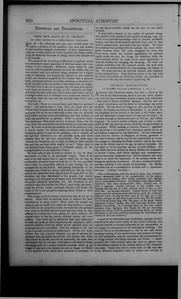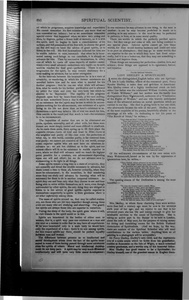Eminent Rosicrucians
Amongst the illustrious names that find a place in the role of the Rosicrucians, there is not one more illustrious—not one that commands greater respect and admiration —than that of Henry Cornelius Agrippa. His life was one of great vicissitudes, and his thirst for knowledge was never satisfied. He was born at Cologne in 1480, and was of good family; he became secretary to Maximilian I., by whom he was knighted, for his bravery in the field, in the Italian wars, and was afterwards created doctor of laws and of physic; he travelled through a considerable part of Europe, and visited England. In 1518 he settled in Mentz, and became a counsellor of the city, but was driven thence by the persecution of the priests. While residing at Geneva, Francis I. appointed him physician to his mother, but refusing to gratify her in an astrological judgment he was dismissed. He was afterwards taken into the service of Margaret of Parma, governor of the Low Countries, but in 1535 he was imprisoned at Lyons, on a charge of defaming the king’s mother; and in the same year, in the fiftieth year of his age, he died at Grenoble. He was twice or thrice married, and had several children. His life, which has been written by Henry Morley, the biographer of Jerome Cardan, with whom Agrippa was contemporary, was an extremely chequered one; and his memory has come down to us under the aspersions of the priests, whose misdoings he fearlessly denounced. He was a profound scholar, and was untiring in his pursuit of knowledge. Mr. Morley describes him as a contemplative German and a representative man. “Palissy,” he says,—
“Was a Frenchman, with the vivacity, taste, and inventive power commonly held to be characteristic of his nation. Cardan was an Italian, with Italian passions; but Agrippa was a contemplative German. According to the vulgar notion, therefore, they were characteristic men. Palissy was by birth a peasant; Cardan belonged to the middle class; Agrippa was the son of noble parents, born to live a courtier’s fife. All became scholars. Palissy learnt of God and nature, and his advances were marvelous upon the unknown paths of truth; he was the first man of his age, as a true scholar, though he bad heaven and earth only Tor his books. The civilized world rang with the fame of the great Italian physician, Jerome Cardan, who had read and written upon almost everything. In a strange place of his own, stands between them Agrippa, who began his life by mastering nearly the whole circle of sciences and arts, as far as books described it, and who ended by declaring the uncertainty and variety of arts and sciences.”
A pupil of the illustrious Jean Trethemus, Agrippa devoted himself with ardor to the study of the occult sciences, and exposed himself, as already intimated, to the persecution of the clergy, in consequence of his astrological writings. The work of his on occult philosophy is full of rare and varied learning, treating of the inward nature and property of things, of their sympathies, and the connection and correspondences of things natural, and things spiritual and divine. I cannot pretend—for I have neither space nor time—to glance even in the briefest manner at the various works of this extraordinary man. Those who wish to learn more of him may find in Mr. Morley's biography much to amuse and instruct, in relation to both Agrippa himself, and to the times in which he lived. It accords with my purpose in these papers on Spirit Agency, however, to notice, though very briefly, Agrippa’s work on the Occult Sciences. He says,—
“Stones and metals have a correspondency with herbs, herbs with animals, animals with the heavens, the heavens with intelligences, and those with divine properties and attributes, and with God himself—after whose image and likeness all things are created.”
From this bond and continuity of nature, all superior virtue, flows, he argues through every inferior, with a long and continuous series; so that inferiors, through their superiors come to the supreme of all. Thus, not only vital, but also angelical and intellectual gifts may be drawn from above.
“Celestial spirits may, in this way, be invoked by men who are of a pure mind, humble themselves, and pray secretly. And by foul and profane men, who use such acts profanely, no man is ignorant that evil spirits may be raised.”
He maintains that the passions, when ardent, not only influence the body of the individual, but can transcend so much as to work also on another body, to produce wonderful impressions on its elements, and remove or communicate disease.
“So the soul, being strongly elevated, sends forth health or sickness to surrounding objects.”
Herein he seems clearly to indicate the root and principle of all mesmeric and spiritual phenomena—that is, in his general view of the reciprocal action of all things and powers, by virtue of their occult sympathies. He also speaks of a prophetic madness falling upon men who are awake, and,—
“Which sometimes draws celestial spirits down into men’s bodies by whose presence and instinct, antiquity testifies, men have been intoxicated and spoken most wonderful things.”
Agrippa is always anxious to urge that it is only by an union of labor and piety that men can hope to attain to divine knowledge. There must be a thorough disciplining of soul and body; and to show in what this consists is one of the great objects of his book on the occult sciences. “Man,” he says—
“Is the temple of the Deity; he can attain to nothing worthy without striving, step by step, on the way to purity, subduing all those powers of, the flesh that war against the soul, engaged in constant contemplation of the divine perfection, constant effort to approach it. To purify himself he must become in all things clean, most clean of all in heart and soul. He must not exceed the necessities of the body, but must be abstinent from all that overclouds the mind, temperate in all things, and dwell much apart from the general crowd of men, in contemplation of celestial things—of angels and intelligences, working out the will of God. But the chief part of inward justification is repentance.” <... continues on page 3-181 >
Lady Shelley a Spiritualist
Among the distinguished English ladies who are Spiritualists is Lady Shelley, widow of the renowned poet, Percy Bysshe Shelley, a name dear and precious to Americans Mrs. Shelley comes of a highly intellectual stock on both sides: her father was the celebrated William Godwin, author of “Caleb Williams,” and her mother was the hardly less distinguished Mary Wolstoncroft, authoress of a “Vindication of the Rights of Woman,” and one who bravely anticipated many of the advanced notions on social questions which are current in our day. She died in giving birth to her one child, who afterwards became the wife of the poet. Shelley, in one of the most exquisite of his poems, beautifully alludes to the parentage of his wife. In dedicating to her his poem of “The Revolt of Islam,” he writes,—
<XI> |
| The Revolt of Islam (a fragment of Dedication) by Percy Bysshe Shelley, 1817 |
Of the well-known circumstances of his own union with Mary Wolstoncroft, bound as he was by the oppression of ignominious laws, he writes,—
<VII> |
| The Revolt of Islam (a fragment of Dedication) by Percy Bysshe Shelley, 1817 |
The opening stanza of the Dedication is among the most beautiful:—
< I > |
| The Revolt of Islam (a fragment of Dedication) by Percy Bysshe Shelley, 1817 |
Mrs. Shelley, to whom these charming lines were written more than half a century ago must be now in the seventy sixth year of her age; and we rejoice to see that in her advanced years she has life and energy enough to give her invaluable services to the cause of Spiritualism. She is taking an active part in the Bazaar to be held in London, about the 20th of May next, for the purpose of raising money for hiring and furnishing rooms for the British National Association of Spiritualism. (And we hope, by the way, there are readers of the Spiritual Scientist who will send contributions to the various tables. Anything from an oil painting to a photograph will be acceptable).
Sir Percy Shelley, Shelley’s only child, and the representative of 1 noble estate which he holds from his grandfather, resides at Boscombe on the Isle of Wight, a much esteemed country gentleman, and a worthy son of his immortal father.
Mrs. Shelley has good reason to be a Spiritualist; for Shelley himself, one of the grandest names in English litera-<... continues on page 3-181 >
Editor's notes
Sources
-
Spiritual Scientist, v. 3, No. 22, February 3, 1876, pp. 256-7
-
Spiritual Scientist, v. 2, No. 8, April 29, 1875, pp. 86-7



